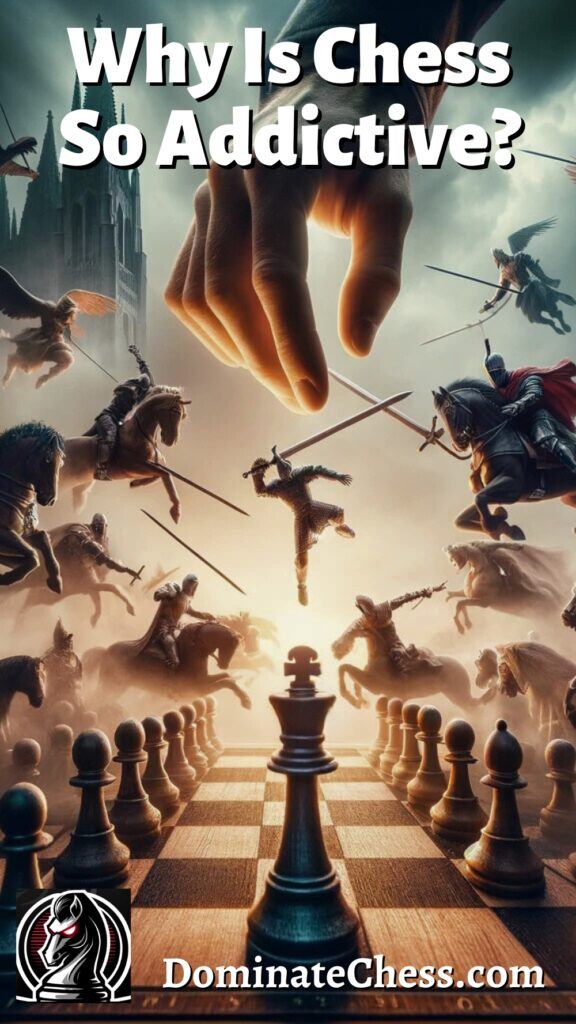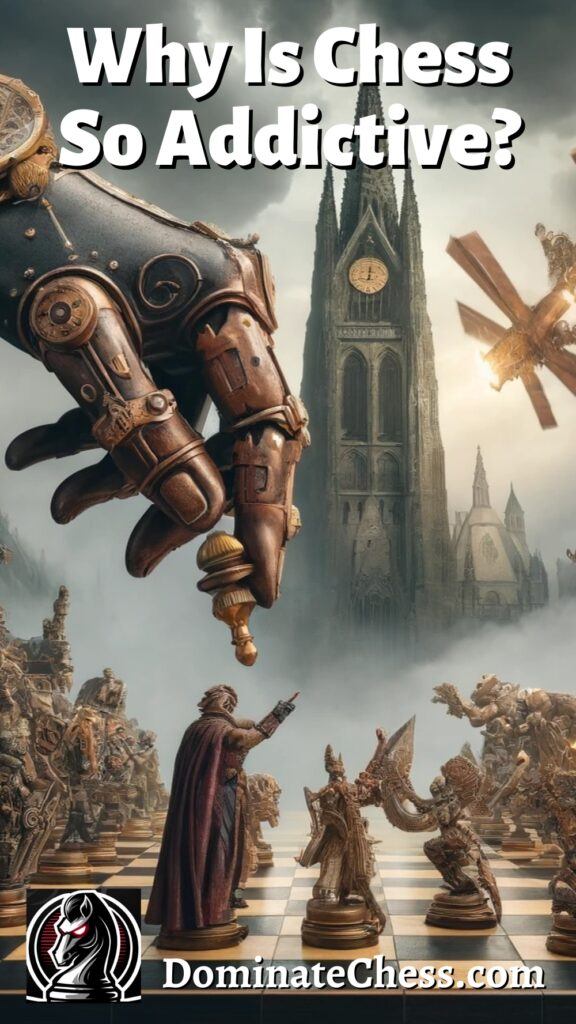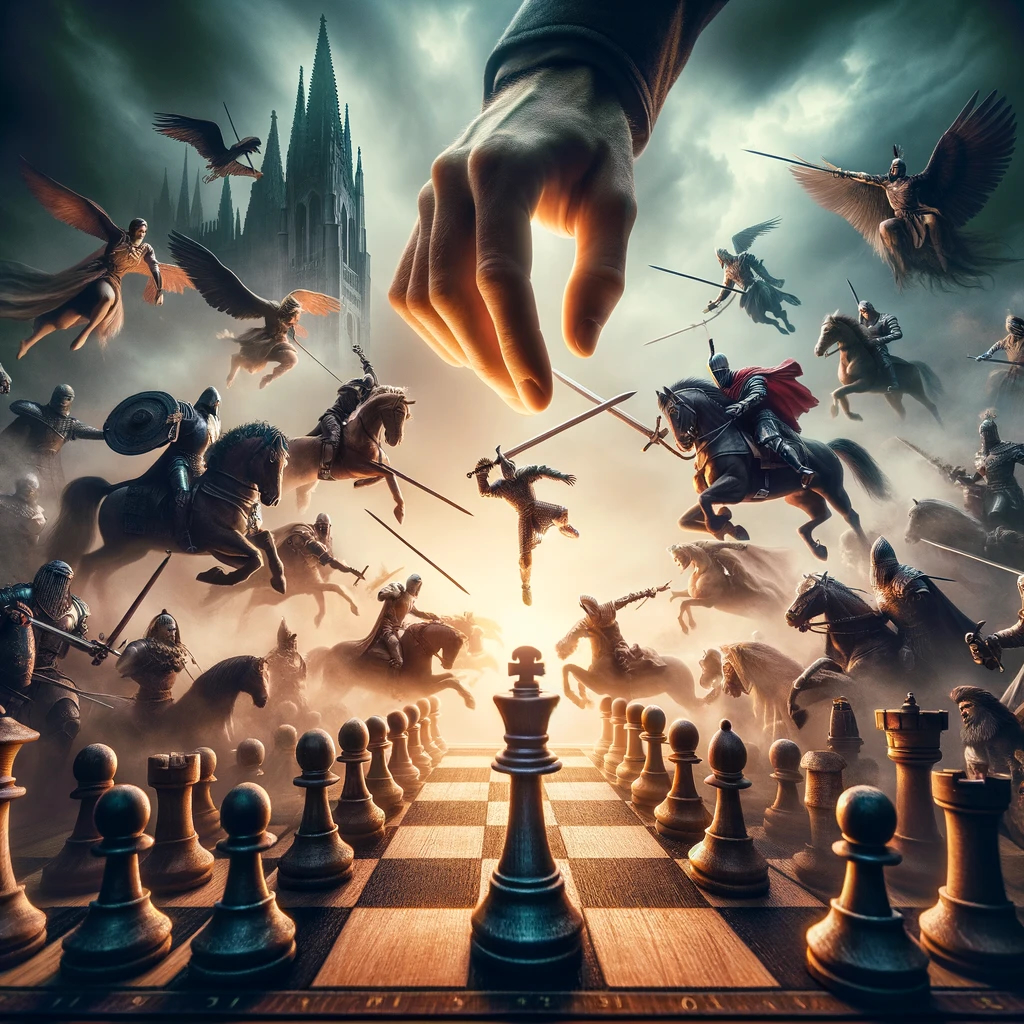I play chess every single day. Probably 10 to 15 games per day. Every break in the day, every restroom break, and any time I’m bored, I’m playing chess. So why am I hooked? Why is chess so addictive?
Why Is Chess So Addictive?
Chess is addictive because of a chemical reaction (dopamine) in our brain that occurs while we play, the intense intellectual stimulation, the uniqueness of every single game, and the drive of live competition!
1. There’s an Actual Chemical Reaction Happening
The brain wants what the brain wants. And when chemical reactions start happening, it can become an undeniable urge. So how does this all work?
When you really enjoy playing a game like chess, your brain will increase levels of the hormone dopamine creating a mild feeling of euphoria. Your brain then associates this happiness with the game and it begins to crave it more and more.
No wonderrrrr!
So now even the thought of starting a new game brings back that feeling of happiness and euphoria and, just like that, your brain is addicted to chess! I know when I play, it’s those first opening moves of the game that I’m seemingly addicted to.
Not knowing how the game will play out, and knowing for a fact that in just a few moves this will be a completely unique game with several problems to solve.
Chemical reactions like this are why we crave things that make us feel good. In many cases, it’s harmless, but sometimes the things we crave are actually doing our body damage.
Thankfully, chess is more of a harmless addiction (in most cases), but extreme cases of chess addiction can lead to unwanted consequences like a loss of interest in everything else and even depression.
So what other reasons lead us to getting hooked?
2. It’s Intellectually Stimulating
I don’t know about you, but for me, chess is the ultimate game of problem solving. Playing chess keeps your brain thinking and makes your mind move.
It challenges your brain to think ahead. The complexity and strategy make it a very desirable game to play. Right from the opening moves, my brain is working. Are they trying to lure me into a trap? Wait, am I so focused on my offense that I’m forgetting to defend?
My brain absolutely FEEDS on this kind of stimulation. And with all the pieces and their completely unique abilities, it just doesn’t get old.
I’ve seen people who are addicted to games and puzzles like sudoku, but to me that’s the same problem you’re solving over and over and over again.
With chess, each and every piece creates an unlimited number of potential problems to solve, and they grow exponentially when your opponent is a master at making their pieces work together.
3. It Improves Both Our Fast & Slow Thinking
Chess is usually considered to be a “slow” game.
We tend to picture to old men staring quietly at a board, right? But have you heard of bullet chess? Bullet chess is one of the most addictive versions of chess out there. What about Sudden Death, or “Armageddon” chess?
If you’ve ever watched anyone play bullet chess or blitz, it makes you literally sit back in awe at how much their brain is processing and how quickly they’re making moves across the board.
So many moves, all made so quickly! Their brain’s fast thinking capacity is off the charts!
Well there’s a reason for that…
Check out this video on the brain science behind chess.
Chess not only improves slow thinking and problem solving, but it goes hand in hand with improving our fast thinking skills as well.
4. Our Thirst for Live Competition
I don’t know about you, but playing chess against a “bot” just doesn’t do it for me. I either feel like it’s way too easy, or it’s impossibly hard.
Have you ever been playing a “live” person on chess.com and then suddenly you realize they’ve employed a “bot” mid game? It’s. The. WORST!
Not only is it cheating, but all the fun and intrigue of the game is lost because you’re suddenly in an impossible situation to win against a computer.
There are those perfectly played games, the games where you make an early blunder but somehow come back to win, and of course the games where you snatch defeat out of the arms of victory.
Trust me, I’ve been there. Having played literally thousands of games (the first step is admitting you have a problem right?) I can tell you with all certainty that live competition is where it’s at!
5. No Two Games are the Same, Ever!
I think for me, this is the reason I can play so many countless games every single day.
With all the thousands upon thousands of potential move possibilities that can occur in a single game, it can truly be said that no two chess games are the same. They’re like snowflakes!
True, when it comes to chess opens, mid game, and closing, there are certain strategic patterns players will employ. So many times the beginning of the game can be the exact same, but all it takes is a single move and the entire rest of the game takes on a life of its own.
Have you ever played against an extremely aggressive or reckless player? It can actually throw your game completely off. I’ve at times used a reckless onslaught when I find myself paired against a player with a much, much higher ranking. And guess what, it’s helped me to WIN!
I can’t think of another game where this is more prevalent.
6. It Takes Countless Games and Hours of Play to Master
There’s a belief that to become a master at anything it takes 10,000 hours of practice. This belief became popularized in one of my absolute favorite books called “Outliers” by Malcolm Gladwell.
Whether you’re a musician, a computer programmer, or a chess player, the benchmark of 10,000 hours of practice should take you to an “expert” level.
But what kind of practice are you putting in? Are you truly studying the game, or just playing? Are you trying out different strategic opening moves? Or just playing the same open over and over?
Are you employing different defenses, like the French, the Sicilian, and testing them out? Or just moving with a knee jerk reaction based on what your opponent’s attack?
If you really want to become a master, then you must first become a student. And with all the dynamic moves and strategies that can be undertaken on that 8×8 square, this can definitely become an addictive journey.
Personally, I would LOVE to become a master at chess. But I don’t know if I can take the time to truly become a student of the game rather than just an avid player as I am now.
7. Could Your Smart Phone Be a Culprit?
We are ALL addicted to our smart phones! Chances are you’re reading this from your smart phone right now.
Admit it.
What if your addiction to chess, with all its live competition and countless dynamic playing strategies, along with that sweet, sweet dopamine release into our brain is literally being COMPOUNDED by the fact that we can play on our HIGHLY ADDICTIVE smart phone at the drop of a hat?
I find myself playing every single time I even have a minute or two of downtime. Why? Because my cell phone is easily accessible and all it takes is opening an app.
Any time I’m sitting in line at the drive thru.
Every time I sit down at a restaurant and I’m waiting for my food.
During the opening credits of a movie I’ve sat down to watch.
Ok I’m realizing I’m either in love with this game or I’m truly addicted.
And because of this synergistic effect that’s happening I feel like I’m glued to my cell phone way, way more than I used to be.
I mean, isn’t it better to be on your phone playing a game of strategy that helps your brain’s problem solving than to just be scrolling and liking on social media?
In my mind, yes, chess is better.
But then again I’m an addict so of course I’d justify it.
Can Chess Addiction Be a Bad Thing? How Harmful is Chess Addiction?
All kidding aside, a true addiction to playing can be serious business and even harmful. There’s some serious discussions going on in the chess forums about chess addiction.
Chess addiction can grow to the extent that you feel like you actually need the game in order experience pleasure in your life and removing discomfort in your life becomes near impossible without it.
True chess addiction can lead to neglecting your responsibilities and isolation from family and friends.
Even though we associate chess with being great for the brain and problem solving, too much can be harmful and actually hurt you cognitive and communication skills.
Thankfully, I’m more in the obsessive category than the addicted category. That’s probably what all addicts say, right?
When I’m busy and doing other things, out with friends, I never feel the need to play chess. It’s just during those quiet times before bed, while waiting for something, during a break, that I want to jump into a game.
Is this you?
How to Deal with Chess Addiction
So what can you do about it if you feel your love for the game is bordering on actual addiction?
Searches across Google provide several actionable tips:
- Associate another less pleasurable (but not harmful) action with the game, such as doing pushups before and after each game.
- Actively reject the urge and replace it with another action. Maybe walk your dogs.
- Replace the addiction entirely with a new activity. (Exercise, reading, etc.)
As with any addiction, this can be easier said than done. Especially when you take into account the absolute convenience of game play just by opening an app.
But willpower is everything when fighting chess addiction.
If you love the game and are playing 25+ games every single day, limit yourself to say 10 games per day. Begin to ween yourself off, and the next month bring it down to 5.
Maybe instead of playing countless games obsessively like I do, try actually studying the game so that your efforts are actually leading you down a positive path.
If you were to become a master at chess, heck, you could actually make money with it and turn it into a career, no?
Final Thoughts
Chess is an addictive game filled with strategy and problem solving. The live competition, the dopamine release, the uniqueness of every game makes it at times hard to put down. But as with everything else, find your BALANCE!
What do you think? Are you as addicted to this game as I am? How many games are you playing each day? Let me know in the comments section below! I love reading your questions and comments and I always reply.
Like This Article? Pin It!




I’m glad I’m not the only one! I seriously feel like my iPad has something to do with it. Anytime I sit down or take a break it’s just my go-to and when that screen comes on guess what’s the first app my fingers goes to? Chess.com! And by the way, this is a really cool niche you have chosen and I don’t just say that as a fellow chess geek. The website is easy to navigate and a great clean layout.
I’m almost afraid to check my phone’s stats for how much time I spend on that app daily, lol. Thanks for the comment! I appreciate the kind words!
Great article; thank you for sharing. I haven’t played chess in a long time, and I used to enjoy it a lot. I probably need to find someone online. Can you recommend some sites where you can play against real people, not against computers, if possible? The excellent article overall made me realise how I missed playing chess. Have a great day. Regards. Vlad
Chess.com is the best, bar none, and you’re playing against real players from all over the world. You don’t even have to wait 5 seconds for the platform to find an opponent. Thanks for the comment!
I’ve been into chess for almost two decades and never even knew there’s such a thing as chess addiction. But after reading this it actually makes sense, I can see how someone can become addicted. I too get a pleasurable sensation when playing, forming strategies etc (especially if I win🙂), but thankfully I’m not the type to get addicted to anything.
It’s one of the most addictive games out there. Thanks for the comment!
***** stars content
I can’t get enough of this game. I feel like it gets my brain going! Love it!
To be honest, same. 🙂
I’ve been playing chess for about 30 years, I was very dedicated when I was young, I honestly didn’t know it was so addictive, but while reading this article of yours it makes sense and I was probably addicted to chess without even knowing it. I have an account on chess.com and my name is “zvekii” you can find me the flag is from Serbia. Let’s play a game for ten minutes or five minutes. I have to read more and come back to your article it is very informative and usefully written on this topic and I am sure it will be useful to many. Thank you .
For sure! My name’s VanceThunder on chess.com. I tend to play live 10 minute games. It kinda throws me off to play turn based when moves can be hours apart depending on the opponent’s availability online. I feel like I lose my plan of strategy.
Having dealt with a few obsessions bordering on addictions myself, I can tell you that in my opinion, it is best for anyone dealing with chess addiction to try and cold turkey it instead of weaning off. You may cave a couple of times, but the anger you feel toward caving in will help you fight the addiction of the activity. Another thing you can do is stop dragging your smartphone around with you everywhere. You could leave it in a locker, a bag, the car, or any other safe place that you would have to go out of your way to get to. Granted none of this will work if you don’t truly want to stop.
I agree. If online chess addiction is the problem, catching it at the root and not being hooked to your smart phone would be a huge help.
Hey,
This is such an inspiring article for me as it takes me back to when I was a kid and I used to play chess in school. I played against friends, not so good friends and even teachers.
I wasn’t the best player, but it felt amazing when I did win. The reason I was addicted to it I believe was because it made me feel like I was a winner. It made me feel like I was superior and gave everyone a reason to look up to me and love me. Haha.
Probably one of the reasons I write a lot and share my knowledge with people. Haha.
Thank you for sharing this and reminding me of those days.
All the best,
Tom
It’s definitely said that chess can create an “elitist” mentality. We all love the game though. For a simple 8×8 board the possibilities are infinite!
Reading this actually makes me want to play a little more, as there are many benefits to the game as you have pointed out.
Next month we are going to the Philippines to be with family for Christmas and my nephew is into chess. We are talking about getting into it while we are there.
I have shared your post with him already.
Very cool! Thanks for the comment and share!
As someone with problems with dopamine, I’ve always been looking for something that would make more dopamine released into my brain. Sometimes it was a special kind of food, sometimes tv shows, and sometimes games. Not concretely chess, but games like sudoku are my hyper fixation or better-said addiction.
I absolutely agree that any kind of addiction can be harmful. That’s why I have been uninstalling the games from time to time, and instead of playing sudoku, I read an article, for example. That’s how I handle when I get hyper-fixated on something.
If a game is taking so much of our time that you’re neglecting responsibilities, then sure. But I think for the most part chess is a harmless type of addiction. Thanks for the comment!
Hey Eric, I’m like this with word searches, squiggles, and spot the difference lol, I’m always looking to challenge myself!
Great article and I would freak out if my other half was that obsessive with his game, but he is obsessed with footy, that’s why I have another tv in the kitchen.?
Keep up the good work and thanks for sharing.?
Thanks so much and thank you for the comment!
Hi Eric,
I strongly agree with you that chess is addictive! I never enjoyed playing chess when I was younger, but, that all changed when Covid hit and I found myself with a lot of free time. I stumbled upon an app, and I started playing chess here and there, and found it to be very stimulating! I enjoy playing on my iPhone, but, it doesn’t compare to playing against a live person.
Chess.com is where it’s at! I play sooo many games daily, lol